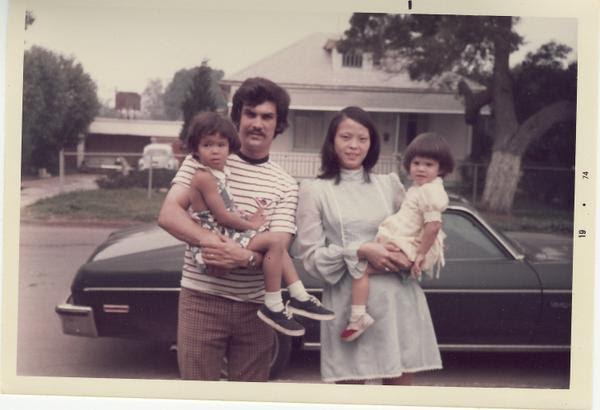“How do you stop a n***er from jumping on the bed?” asked Sil Lai Abrams’ younger sister. “You put Velcro on the ceiling!”
As they both roared with laughter, Sil Lai’s father came charging into the room and said, “I don’t know why you’re laughing, Sil Lai, you’re one,” stopping them in their tracks.
This is how Sil Lai, a mom of two, discovered that she wasn’t Caucasian and Chinese like she’d been brought up to believe, but part Black. And this is the premise of her fascinating new memoir, “Black Lotus,” based on her NABJ award-winning essay for Ebony magazine. And while Sil Lai’s life has more turns than a reality TV show, you never stop rooting for her as she battles through family dysfunction, addiction, abusive relationships, and herself, to ultimately find her true voice.
Today, the domestic violence awareness advocate and founder of Truth In Reality, a non-profit organization centered on changing the imbalanced depiction of women of color in the media, is standing tall and owning every part of her story.
Recently, Sil Lai carved out a few minutes to chat with us about her life and “Black Lotus.”
Where did the title “Black Lotus” come from?
Sil Lai: A lotus is a symbol of purity in Buddhism. It’s he or she who is born in the muck and arises to the surface and is cleansed. That’s been my life journey. Also, my Chinese side is Buddhists and I’m Black, so it has a lot of spiritual significance to me.
Why did you decide to write this book?
It was an opportunity to shed light on an unusual experience of being Black in America. My story isn’t the norm for someone of biracial descent in any respect. I’m not like actor Jesse Williams, who was raised with a Black parent. I’m not even like President Obama who wasn’t raised with his biological father but knew his dad was Black. My family intentionally lied about my blackness for a variety of reasons that I include in the book, such as my Dad’s White privilege and post-racial ideology due to his religious beliefs. For people who had read the Ebony magazine essay on the subject of how I came to learn the truth about my racial heritage, I realized there was a lot of interest around the subject of racial identity. Expanding it to book form made sense.
You really speak openly and honestly about your family, were you worried about their reaction?
My children are both holding off on reading it. They’re 21 and 26 years old. They’re old enough, but I think they are afraid because it’s a very transparent depiction of their mother. My Chinese side hasn’t read it. There’s a language barrier, and I’m also breaking so many taboos by telling this story. I don’t want to hurt anybody and it wasn’t written in that spirit, but I wanted to give an honest account from an emotional perspective of what it was like growing up me. There’s nothing in the book that I can’t stand by.
Do you plan to look for your biological (African American) father?
I did try to find him, and I was unsuccessful. It was around the time that I reconnected with my biological mother. But based on that experience and the outcome (Sil Lai and her Chinese mother haven’t talked since 1997), I’m cool. It’s interesting because the last time I saw my biological mother she was 46-years-old, and this book is published when I’m 46, so I feel there is something significant about that.
Given the very complicated relationship with your family, where do you draw your emotional strength?
From my very close friends and my best friend of 27 years. She’s 20 years older than me and she was what I would call a maternal surrogate during our first few years of friendship. She loved me unconditionally through behaviors that had me socially ostracized by everyone else and eventually it became a grounding force in my life. But still, there’s no replacement for family. In a lot of ways, knowing that I’m on my own drives my need to create and strive for excellence.
Why did you include Eddie Murphy?
I included Eddie Murphy in the book because he was the first Black man that I ever kissed. Had the person been a non-celebrity, someone else’s name would have been there instead. (laughs) But it was with Eddie that I crossed the proverbial “color line.” There are a lot of names left out of the book because I didn’t want it to be a tell-all. But including that as well as the part about the sexual assault at the hands of a music mogul that left me in the hospital, along with my daughter’s father who battered me, is important because it explains a lot of the advocacy work I do in domestic violence today.
Acceptance was a big part of your journey. Do you still seek it?
I think we all do want acceptance, but I’m no longer willing to compromise myself for it. I’m an activist, so clearly I’m not seeking to be accepted by a large segment of society, nor would I have written this book. I realize that you have to accept yourself first. If you know yourself then you will find people who will love you for who you are.
To purchase a copy of “Black Lotus” visit Simon & Schuster and Amazon.com or Silliaabrams.com
For more on writer and mom Erickka Sy Savané visit erickkasysavane.com or follow her on Instagram and Twitter. Also check out her POP MOM video series right here on Madamenoire.











